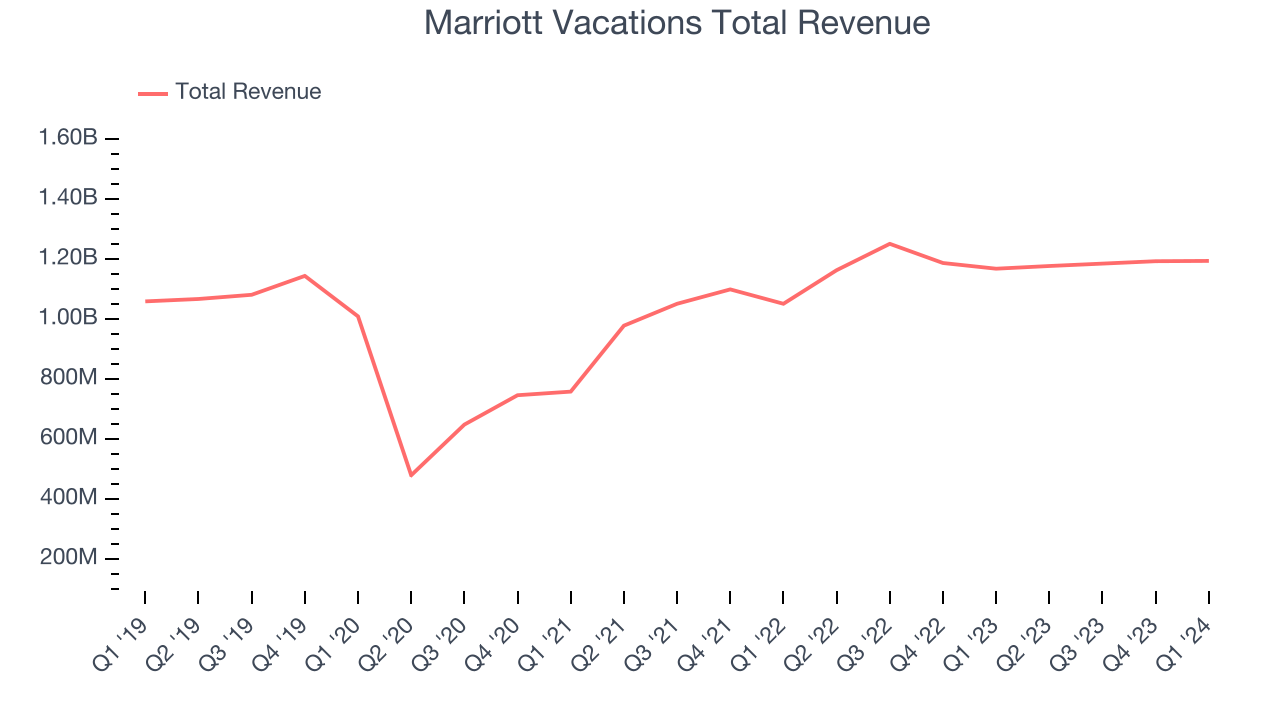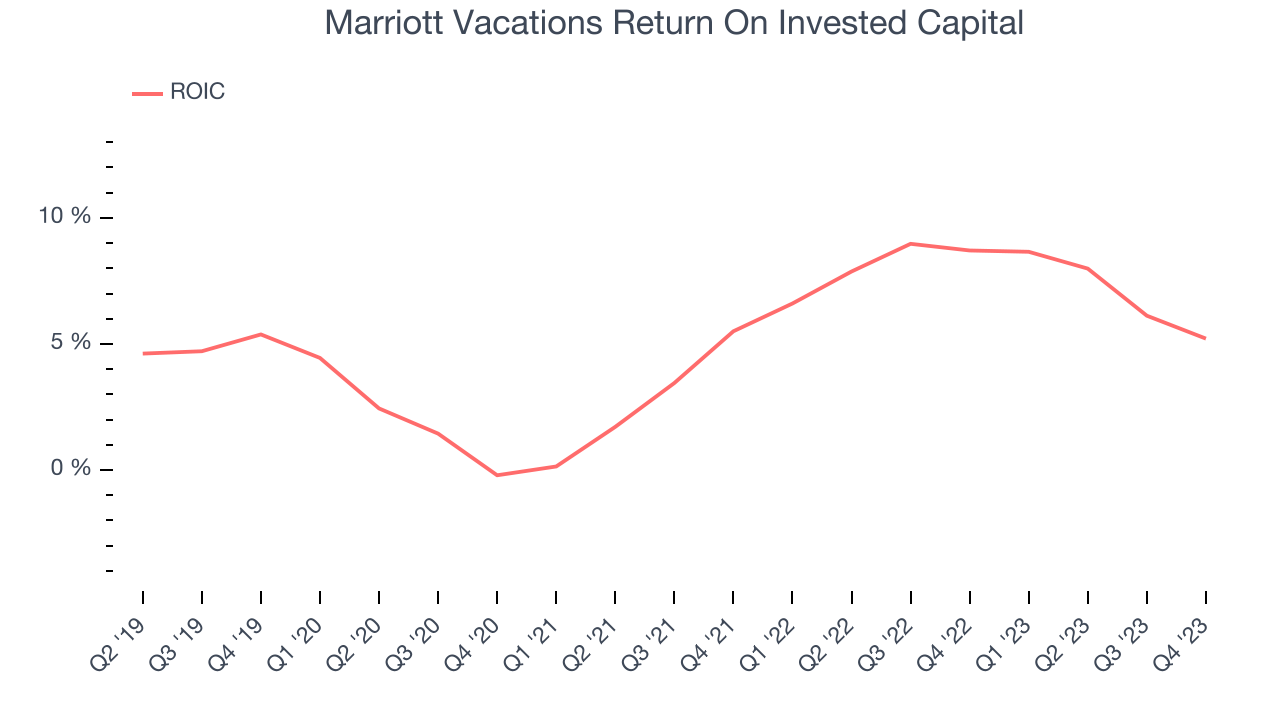Vacation ownership company Marriott Vacations (NYSE:VAC) beat analysts' expectations in Q1 CY2024, with revenue up 2.2% year on year to $1.20 billion. It made a non-GAAP profit of $1.80 per share, down from its profit of $2.45 per share in the same quarter last year.
Marriott Vacations (VAC) Q1 CY2024 Highlights:
- Revenue: $1.20 billion vs analyst estimates of $1.17 billion (1.9% beat)
- Adjusted EBITDA: $187 million vs analyst estimates of $179 billion (4.7% beat)
- EPS (non-GAAP): $1.80 vs analyst estimates of $1.73 (4.2% beat)
- Full year guidance for EPS (non-GAAP): $7.81 at the midpoint vs analyst estimates of $7.94 (1.6% miss)
- Gross Margin (GAAP): 74.1%, down from 77.1% in the same quarter last year
- Market Capitalization: $3.42 billion
Spun off from Marriott International in 1984, Marriott Vacations (NYSE:VAC) is a vacation company providing leisure experiences for travelers around the world.
Marriott Vacations operates through three primary segments: Vacation Ownership, Exchange and Third-Party Management, and Rentals. The Vacation Ownership segment includes the development, marketing, sale, and management of vacation ownership products under several brand names, including Marriott Vacation Club, Grand Residences by Marriott, and The Ritz-Carlton Destination Club. These brands represent a range of luxury to upscale vacation properties, offering customers the opportunity to purchase timeshare intervals at various resorts.
The Exchange and Third-Party Management segment, operating primarily under the Interval International brand, provides exchange, rental, and resort management services. Interval International, a prominent global provider of vacation exchange, offers its members the flexibility to exchange their vacation ownership for time at different resorts around the world, enhancing the value and utility of vacation ownership.
The Rentals segment includes rental operations related to the company's owned and managed vacation ownership resorts. This segment allows travelers to experience the Marriott Vacation Club brand without owning a timeshare, offering the flexibility of short-term vacation rentals.
Hotels, Resorts and Cruise Lines
Hotels, resorts, and cruise line companies often sell experiences rather than tangible products, and in the last decade-plus, consumers have slowly shifted from buying "things" (wasteful) to buying "experiences" (memorable). In addition, the internet has introduced new ways of approaching leisure and lodging such as booking homes and longer-term accommodations. Traditional hotel, resorts, and cruise line companies must innovate to stay relevant in a market rife with innovation.
Marriott Vacations's primary competitors include Travel + Leisure (NYSE:TNL), Hilton Grand Vacations (NYSE:HGV), Bluegreen Vacations (NYSE:BXG), Interval Leisure Group (NASDAQ:IILG), and private companies Diamond Resorts and Anantara Vacation Club.Sales Growth
Examining a company's long-term performance can provide clues about its business quality. Any business can put up a good quarter or two, but the best consistently grow over the long haul. Marriott Vacations's annualized revenue growth rate of 6.6% over the last five years was weak for a consumer discretionary business.  Within consumer discretionary, a long-term historical view may miss a company riding a successful new property or emerging trend. That's why we also follow short-term performance. Marriott Vacations's annualized revenue growth of 6.6% over the last two years aligns with its five-year revenue growth, suggesting the company's demand has been stable.
Within consumer discretionary, a long-term historical view may miss a company riding a successful new property or emerging trend. That's why we also follow short-term performance. Marriott Vacations's annualized revenue growth of 6.6% over the last two years aligns with its five-year revenue growth, suggesting the company's demand has been stable.
This quarter, Marriott Vacations reported reasonable year-on-year revenue growth of 2.2%, and its $1.20 billion of revenue topped Wall Street's estimates by 1.9%. Looking ahead, Wall Street expects sales to grow 5.7% over the next 12 months, an acceleration from this quarter.
Operating Margin
Operating margin is a key measure of profitability. Think of it as net income–the bottom line–excluding the impact of taxes and interest on debt, which are less connected to business fundamentals.
Marriott Vacations has managed its expenses well over the last two years. It's demonstrated solid profitability for a consumer discretionary business, producing an average operating margin of 14.2%.in line with the same quarter last year. This indicates the company's costs have been relatively stable.
EPS
We track long-term historical earnings per share (EPS) growth for the same reason as long-term revenue growth. Compared to revenue, however, EPS highlights whether a company's growth was profitable.
Over the last five years, Marriott Vacations's EPS grew 11.6%, translating into a weak 2.2% compounded annual growth rate.
In Q1, Marriott Vacations reported EPS at $1.80, down from $2.45 in the same quarter last year. Despite falling year on year, this print beat analysts' estimates by 4.2%. Over the next 12 months, Wall Street expects Marriott Vacations to grow its earnings. Analysts are projecting its LTM EPS of $6.73 to climb by 24.8% to $8.40.
Return on Invested Capital (ROIC)
EPS and free cash flow tell us whether a company was profitable while growing revenue. But was it capital-efficient? A company’s ROIC explains this by showing how much operating profit a company makes compared to how much money the business raised (debt and equity).
Marriott Vacations's five-year average return on invested capital was 5%, somewhat low compared to the best consumer discretionary companies that pump out 25%+. Its returns suggest it historically did a subpar job investing in profitable business initiatives.

The trend in its ROIC, however, is often what surprises the market and drives the stock price. Over the last few years, Marriott Vacations's ROIC averaged 5.3 percentage point increases. This is a good sign, and we hope the company can continue improving.
Balance Sheet Risk
As long-term investors, the risk we care most about is the permanent loss of capital. This can happen when a company goes bankrupt or raises money from a disadvantaged position and is separate from short-term stock price volatility, which we are much less bothered by.
Marriott Vacations reported $237 million of cash and $3.11 billion of debt on its balance sheet in the most recent quarter. As investors in high-quality companies, we primarily focus on two things: 1) that a company's debt level isn't too high and 2) that its interest payments are not excessively burdening the business.
With $745 million of EBITDA over the last 12 months, we view Marriott Vacations's 3.9x net-debt-to-EBITDA ratio as safe. We also see its $151 million of annual interest expenses as appropriate. The company's profits give it plenty of breathing room, allowing it to continue investing in new initiatives.
Key Takeaways from Marriott Vacations's Q1 Results
It was good to see Marriott Vacations beat analysts' revenue expectations this quarter. We were also happy its EPS narrowly outperformed Wall Street's estimates. On the other hand, its full-year earnings forecast was underwhelming and missed expectations. Zooming out, we think this was still a decent, albeit mixed, quarter, showing that the company is staying on track. The stock is up 4.6% after reporting and currently trades at $102 per share.
Is Now The Time?
Marriott Vacations may have had a favorable quarter, but investors should also consider its valuation and business qualities when assessing the investment opportunity.
We cheer for all companies serving consumers, but in the case of Marriott Vacations, we'll be cheering from the sidelines. Its revenue growth has been uninspiring over the last five years. And while its projected EPS for the next year implies the company's fundamentals will improve, the downside is its relatively low ROIC suggests it has historically struggled to find compelling business opportunities. On top of that, its EPS growth over the last five years has been subpar.
Marriott Vacations's price-to-earnings ratio based on the next 12 months is 11.6x. While there are some things to like about Marriott Vacations and its valuation is reasonable, we think there are better opportunities elsewhere in the market right now.
Wall Street analysts covering the company had a one-year price target of $113.22 per share right before these results (compared to the current share price of $102).
To get the best start with StockStory, check out our most recent stock picks, and then sign up for our earnings alerts by adding companies to your watchlist here. We typically have the quarterly earnings results analyzed within seconds of the data being released, and especially for companies reporting pre-market, this often gives investors the chance to react to the results before the market has fully absorbed the information.
